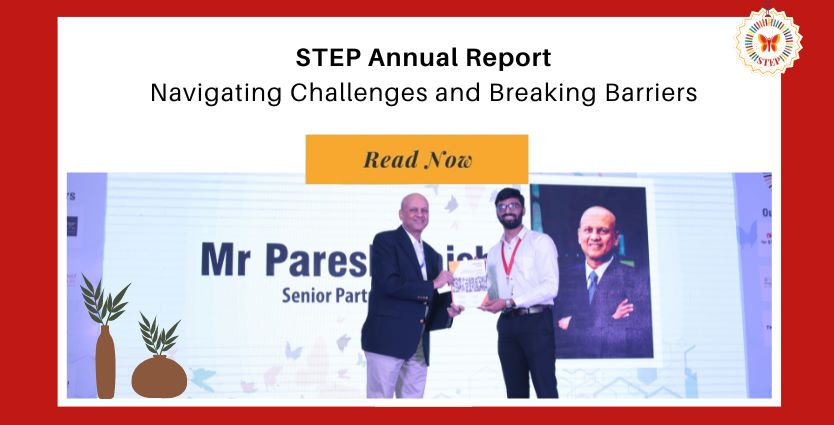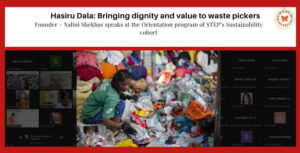Navigating Challenges and “Breaking Barriers”: Women social entrepreneurs and their resilience in establishing their startups
Recently STEP released a report on Navigating challenges and “breaking barriers”: Women social entrepreneurs in India and their resilience in establishing their startups. (A mixed-methods study)
The report was conducted in partnership with the University of Texas and co-authored by:
- Bonita.B. Sharma, Ph.D.Assistant Professor, University of Texas at San Antonio
- Akshay Bapte, Program Associate, STEP
- Reinu Shah, Founder & CEO, STEP
- Eusebius Small, Ph.D. Associate Professor, University of Texas, University of Arlington
Introduction
The report analyzes the challenges of women social entrepreneurs in India while establishing their startups and their efforts to address them. We surveyed 23 women social entrepreneurs from India and in-depth interviews with 10 of them to develop a comprehensive understanding of their experiences as entrepreneurs in the social sector in India.
The premise of the report
The report surveyed various aspects related to women in social entrepreneurship issues, including economic challenges associated with social entrepreneurship, the cost of starting and running a business, barriers holding them back, the impact of startup challenges on personal and social well-being, and policy factors influencing social entrepreneurship.
Challenges associated with the source of capital:
Most(88.34%) of the first-generation social entrepreneurs reported they started their business by bootstrapping, followed by a few who used fundraisers (11.76%).
In comparison, 66.6% of those non-first-gen entrepreneurs said they used bootstrapping to start their businesses, with some (33.33%) stating they used institutional support.
Challenges associated with the cost of starting a business:
The response to the cost of starting the business was significantly related to the startup stage.
Most of the first gen (87.50%) said they needed more than 10K to 100K to start their business.
Most (45.45%) of the early-stage startups reported over 100K as the cost to start the business.
Most (70%) of those with non-profit social enterprises reported needing 10K to 100K in funding.
Challenges associated with main running a business:
Most of the first-gen entrepreneurs reported that they have funding(47.06%), operational (23.53%), and financial-related challenges, (11.76%) while Non-first-gens mentioned operational (50%) or hiring (33.33%) challenges. This has no significant correlations. However, funding challenges were a consistent theme.
Factors that held them back in their business:
The majority of the first-gen specified money (23.53%) and time (35.29%), while the non-first-gen mentioned a lack of support or role model (33.33%) and money (33.3%).
Women social entrepreneurs in our study reported time, lack of support, and money as the factors holding them back from their success level.
Hiring the right person with consistent values, skills, and vision and keeping the team small due to restricted funding are some themes that emerged.
In terms of hiring, bringing women on board and upskilling them was a challenge. Also, hiring men willing to listen to a woman-boss is one of the significant challenges.
Personal and social well-being considerations while faced with startup-related challenges
In our study, we wanted to examine the ways women social entrepreneurs deal personally with the challenges associated with their enterprise.
Responses to challenges:
In terms of dealing with challenges, our first-gen respondents were more likely to engage in mindful thinking (41.18%), while non-first-gen respondents said they would talk to a mentor or a coach. Those in early-stage startups are also more likely to engage in mindful thinking (45.45%), and those in the expansion (66.67%) and growth (33.3%) stage said they are more likely to talk to a mentor or a coach.
Self-care hours:
The majority of our first-gen respondents reported setting aside some time for self-care (52.94%) compared to non-first-gen who said they set aside little time for self-care(66.67%).
Those in early-stage startups (54.55%) and expansion stage(66.67%) were more likely to set aside moderate time for self-care compared to those in the growth stage (55.56%).
Policy-related factors associated with social entrepreneurship challenges
Several structural and political factors remain challenging for women entering social entrepreneurship. Our survey asked women about the difficulties in starting a social organization, accessing bank loans, understanding the tax code for social organizations, and barriers to the legal language used in the social entrepreneurial arena.
Difficulties associated with starting a social organization:
In terms of their response to whether women social entrepreneurs face difficulties in starting a social organization, more of the first-gens responded yes (47.06%) compared to a maybe response (66.67%) from Non-first-gen.
Difficulty in accessing a bank loan:
In response to difficulties in accessing a bank loan, most of both first-gen (47.06%) and non-first-gen (50%) women social entrepreneurs responded that they may have challenges.
Confusing tax code for social organization:
Confusing tax codes can be problematic for anyone starting a business. Interestingly, our non-first-gen respondents said yes, they are (50%) compared to maybe responses from the first-gen (45.45%)
Difficult legal language for social organization:
The legal language for the social organization was difficult for the first-gen respondents (66.67%) and non-first-gens (52.94%)
Findings of the report
- Women often face financial and operational challenges in startups and a lack of guidance to overcome them.
- Most first-generation entrepreneurs in the study used bootstrapping methods such as savings or borrowing to source the capital for their start-ups.
- The main challenge for the participating entrepreneurs was finance and hiring.
- Women social entrepreneurs in incubation programs get invaluable insights into the economic, social, personal, and policy-related challenges they may encounter. This helps to empower them with effective strategies to navigate and overcome these obstacles.
Recommendations & Conclusion
- Women entrepreneurs need mentors, financial support, and the know-how on access to capital to start their social enterprises.
- Women sacrifice their time, money, and social life for their businesses. Providing more financial access, knowledge, and understanding of resources can bolster the success of women social entrepreneurs.
- Women who are first-gen, young, unmarried, have lived in rural settings, and running early-stage, non-profit organizations have less experiential exposure and formal guidance but are more likely to solve challenges. More outreach and support with formal guidance are required for such social entrepreneurs.
- All across the board, there is room for more clarity and understanding of legal and tax codes. Offering training related to the jargon, tax codes, and legal languages explicitly applied to social enterprises can provide support for women social entrepreneurs.
- Creating a sustainable work-life balance, essential for a successful business lifestyle, can be achieved by promoting self-care strategies by providing physical and mental health resources.
- The findings call on programs like STEP to develop or continue training women entrepreneurs in financial access and knowledge and legal and tax code-related training, bolster mentorship programs, and promote work-life balance through physical and mental health awareness.
Notes:
- Mixed methods research combines elements of quantitative and qualitative research to answer your research question.
- A first-generation entrepreneur is someone who is the first in their family lineage to start their own business.
- Women sacrifice their time, money, and social life for their businesses. Providing more financial access, knowledge, and understanding of resources can bolster the success of women social entrepreneurs.
- Notes:
- Mixed methods research combines elements of quantitative and qualitative research to answer your research question.
- A first-generation entrepreneur is someone who is the first in their family lineage to start their own business.
- Women who are first-gen, young, unmarried, have lived in rural settings, and running early-stage, non-profit organizations have less experiential exposure and formal guidance but are more likely to solve challenges. More outreach and support with formal guidance are required for such social entrepreneurs.
- Notes:
- Mixed methods research combines elements of quantitative and qualitative research to answer your research question.
- A first-generation entrepreneur is someone who is the first in their family lineage to start their own business.
- Women entrepreneurs need mentors, financial support, and the know-how on access to capital to start their social enterprises.
- Women sacrifice their time, money, and social life for their businesses. Providing more financial access, knowledge, and understanding of resources can bolster the success of women social entrepreneurs.
- Women who are first-gen, young, unmarried, have lived in rural settings, and running early-stage, non-profit organizations have less experiential exposure and formal guidance but are more likely to solve challenges. More outreach and support with formal guidance are required for such social entrepreneurs.
Recommendations & Conclusion Recommendations Notes:



